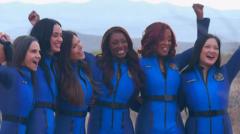In a momentous occasion for space tourism and gender representation in aerospace, an all-female crew, including singer Katy Perry, successfully returned from a brief journey into space aboard Blue Origin's New Shepard rocket. The mission, which launched from West Texas, reached altitudes over 100 km (62 miles) and offered its six passengers a few moments of weightlessness, sparkled with emotional moments and meaningful connections.
Joining Perry on the flight were notable figures such as Lauren Sánchez, fiancée of Blue Origin founder Jeff Bezos; CBS host Gayle King; former NASA rocket scientist Aisha Bowe; civil rights activist Amanda Nguyen; and film producer Kerianne Flynn. As they landed back on Earth, cheers filled the capsule, signifying the emotional weight of the achievement.
Perry expressed a profound sense of connection to life upon her return, touching down with a kiss to the ground and lifting a daisy to the sky—a nod to her daughter named Daisy. King also expressed gratitude, kneeling to appreciate the Earth beneath her. Flynn celebrated the experience with a triumphant proclamation, stating, "I went to space."
Celebrity onlookers, including Khloé Kardashian, noted the emotional intensity of the event, with Kardashian sharing sentiments about the accessibility of dreams in today’s world. Oprah Winfrey remarked on Gayle King’s significant achievement, highlighting her fears of flying and the courage it took for her to face them in the space context.
However, this flight raised discussions about the nature of space tourism versus traditional scientific exploration. Critics, including Dr. Kai-Uwe Schrogl from the European Space Agency, voiced concerns about celebrity-filled flights overshadowing legitimate scientific missions. Despite these critiques, the crew defended the mission, emphasizing the powerful impact and inspiration it offered to young women, with support from Sánchez, who welcomed constructive dialogues.
Founded in 2000 by Bezos, Blue Origin aims to make space travel more feasible and safe with reusable rockets like New Shepard. As the industry evolves, the environmental implications of rocket launches remain contentious. Critics stress that, despite Blue Origin’s claims of low-emission flights, the accumulation of water vapor in the upper atmosphere from rocket emissions could pose risks to the climate and ozone layer.
While the endeavor showcases a step towards inclusivity in space, its high cost excludes many. The debate continues as society navigates the balance between space exploration, environmental impacts, and social equity. Observers are left to ponder whether space tourism's lofty ideals will manifest in more sustainable practices or remain a privilege for the affluent.




















